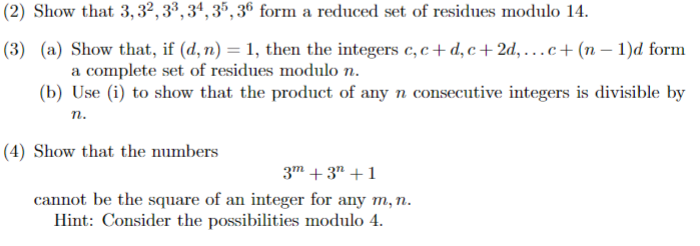Original post by NoahMal
Hi, I'm very confused on how to start any of the following questions, If anyone knows the first few steps to take with each question hopefully I'll be able to attempt them further.
Thank you very much,
Noah
Thank you very much,
Noah
Question 2.
Begin with the definition of a Reduced Residue System (RRS) modulo . Not sure what definition wording you are given (post it if it's different from mine) but it should effectively be the following:
Def (RRS mod n): A set of integers such that each element is coprime to , and no two elements are congruent to each other modulo .
is the Euler phi-function.
For Q2, it is sufficient to show that are all coprime to , and then show that they each take on distinct values when evaluated mod 14.
Original post by NoahMal
Hi, I'm very confused on how to start any of the following questions, If anyone knows the first few steps to take with each question hopefully I'll be able to attempt them further.
Thank you very much,
Noah
Thank you very much,
Noah
Q4 (mentioning it before you reply to the last one because this one is simple)
It tells you to consider the expression mod 4. So do that. Note that hence the expression mod 4 is .
There are three things to consider; when are both even, when they are both odd, or when they are of different parity.
Also note that every square number is either 0 or 1 (mod 4)
Original post by RDKGames
Question 2.
.
.
.
.
.
.
For this question I showed that if d_1|3 and d_1|14 where d_1=1 means they're co prime,
Then I showed if d_2|3^2 => d_2|3*3 , and d_2|14 where d_2=1 therefore its also co-prime
therefor for all 3^n in the set they are coprime with 14?
Is this sufficient?
Original post by RDKGames
Q4 (mentioning it before you reply to the last one because this one is simple)
.
.
.
.
.
.
Having worked out the different cases I found that n,m odd give -1, n,m even give 3 and different parity give 1.
What does this result show us ?
Original post by NoahMal
For this question I showed that if d_1|3 and d_1|14 where d_1=1 means they're co prime,
Then I showed if d_2|3^2 => d_2|3*3 , and d_2|14 where d_2=1 therefore its also co-prime
therefor for all 3^n in the set they are coprime with 14?
Is this sufficient?
Then I showed if d_2|3^2 => d_2|3*3 , and d_2|14 where d_2=1 therefore its also co-prime
therefor for all 3^n in the set they are coprime with 14?
Is this sufficient?
I'd say you're sort of on the right lines. Notice that if we say and that then either or . Of course, this means either or since 7,2 are prime numbers making up 14...
But not 7 nor 2 divides . Is it obvious why?? So really, is the only possibility for the statement to hold true, hence are coprime to 14 for .
Wow TSR is slow today...
(edited 5 years ago)
Quick Reply
Related discussions
- BMO 1993, Round 1, Question 3
- Correlation between UKMT Maths challenge and being able to do Maths at Uni
- TSR Study Together - STEM vs Humanities!
- A Level Maths vs IB SL AA Maths
- Worried about degree difficulty - Chemistry
- Tips for A*s?
- Cardiff University Maths students - What are/were your experiences of Cardiff?
- Are my grades good enough for engineering
- Lse economics
- Does further maths help with maths entrance exams?
- Maths and Economics Degree without Economics A-Level
- BA Primary Education
- Maths and Philosophy?
- cs at ucl without fm
- Economics without Econ A level
- Cambridge Maths bad gcse ? ahhhhhhh
- Choosing alevels help urgent
- hesitant on firming warwick for maths - advice needed pleaseeee
- Will taking Further Maths as a third subject be a disadvantage to apply for uni?
- AS vs A Level Business Edexcel
Latest
Trending
Last reply 3 days ago
Did Cambridge maths students find maths and further maths a level very easy?Last reply 2 weeks ago
Edexcel A Level Mathematics Paper 2 unofficial mark scheme correct me if wrongMaths
71
Trending
Last reply 3 days ago
Did Cambridge maths students find maths and further maths a level very easy?Last reply 2 weeks ago
Edexcel A Level Mathematics Paper 2 unofficial mark scheme correct me if wrongMaths
71





